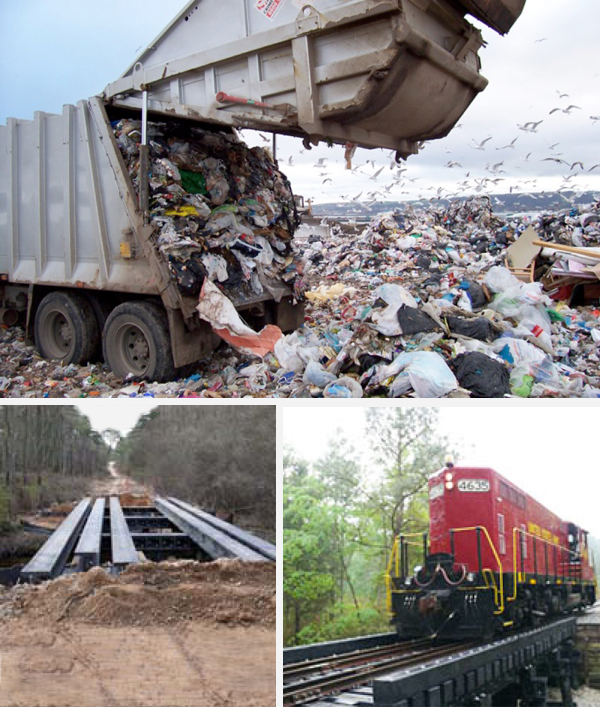The biggest climate challenge is in our minds. We’ll get nowhere until we can “think anew, and act anew”. [18 January 2011 | Peter Boyer]
“People just don’t know what to expect,” was the response of Brisbane resident Debbie Wilks, aged 50, to a reporter’s question about the city’s floods. “I think everyone realises we are dealing with something we have never seen before.”

THINK ANEW, ACT ANEW: The bridges, made from cast-off plastic, represent a paradigm shift. Photos Duncan Freemantle
That said it all. Like the polar-opposite Victorian bushfires less than two years ago, nothing could have prepared people for Queensland’s Big Wet: for the weeks of coastal and inland drenching, the shock of the Toowoomba deluge, or the slow, dreadful inevitability of the Brisbane flood.
Everyday decisions — what to wear today, how to placate a troubled child or deal with an awkward client, where to park the car or when to catch the bus — suddenly became utterly irrelevant.
This was one of those events that really concentrates the mind. Confronted by the awesome power of nature, everyone understood like Debbie Wilks that the supports they had come to rely on — technology and the authority of government — were not going to be enough.
Instead, people focused on surviving and helping others, showing how resourceful our species can be. Out of adversity came ingenuity, courage and generosity.
The Queensland experience illuminates the biggest of all the questions around the great climate debate: how can we prepare ourselves for a new tomorrow, where old paradigms no longer fit?
So far, our main concerns with climate and energy have centred on physical reality. Humans have proven really good at figuring out how something works (science) and then how to make it work better (technology). The success of that practical curiosity has made us today’s dominant species.
But our supporting technologies work only while nature remains within predictable limits. They’re pretty well useless when natural systems step outside those limits, such as happened in Queensland. In these circumstances, we need a paradigm shift.
We can expect more of these challenging times. A warming of the air and the sea’s surface intensifies the water cycle, increasing the potential for both drought and rainfall to become more severe, and for extreme events to happen more often. In such circumstances one of the things that gets battered is our notion of what’s normal.
We’re not just talking about weather and climate here. Modern times have thrust into the limelight a whole range of basic things that we’ve always taken for granted but which must now be re-assessed. As individuals, groups and governments, we need to do a wholesale re-ordering of our priorities.
I’m not finding this easy myself. For instance, when I wrote recently about aviation’s very high short-term impact on climate, I said that air travel as we now know it “has gone about as far as it can (or should) go”. I stopped short of uttering the paradigm shift: that we have to end our flying habit. But that’s what has to be done.
Think what this means. It’s not just the Jo Averages having to give up some time out in far-off places. All the power-brokers of government and business, all the assistants and advisers and conference junkies (yes, including climate delegates) would have to put principles ahead of perks. Can you imagine that happening? I can’t.
The paradigm dilemma was illustrated perfectly in a meeting I attended last week. Organised by oyster farmer Phil Soley and Hobart’s Business East, and attended by ministerial advisers and Labor MP Rebecca White, the meeting invited a fresh look at plastics recycling in Tasmania.
Recycling is fundamental to our future well-being. The stuff we discard is choking the life out of our natural environment, and of all contaminants, the many products of the fossil-fuel revolution that we lump together under the name “plastic” present the biggest headache of all.
Tasmanians aren’t good at recycling. Melbourne-based sustainability consultant Duncan Freemantle told the meeting that of the 35,253 tonnes of plastic consumed by Tasmanians in 2008, only 0.4 per cent was recycled — and of that tiny amount, only 13 per cent was actually processed in Tasmania.
It’s not enough that we continue to bleat about our small, scattered population, or our lack of economic muscle. We keep telling the world we’re clean and green, but our ever-growing landfills say otherwise. We have to take responsibility for what we do in our own backyards.
Plastics are adaptable and pliable, and they resist rotting. Apart from being returned to their original use, they can be combined in a wood-replacement product for a multitude of purposes from park benches, picnic tables, signposts and barriers right up to wharves, railway sleepers and bridges.
As Freemantle said, we have to start seeing such material not as “waste” but as an opportunity waiting to be realised. A commercially viable operation needs community backing, which can’t happen without a strong, focused legislative and public education effort by government.
Abraham Lincoln said that in tough times “we must think anew, and act anew” — exactly what Tasmanians must do to meet the challenges posed by this new age. To enable this to happen would be real leadership. We’ve never needed it so much as now.
